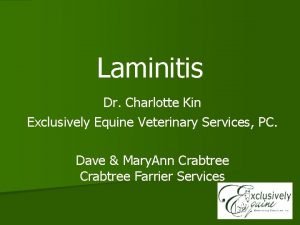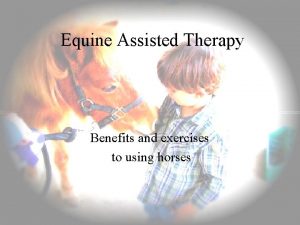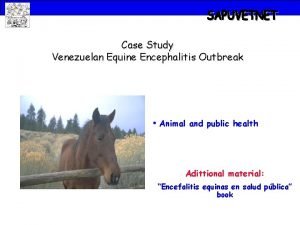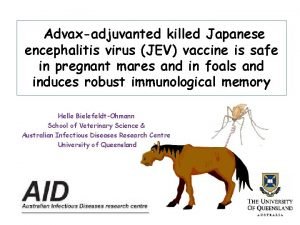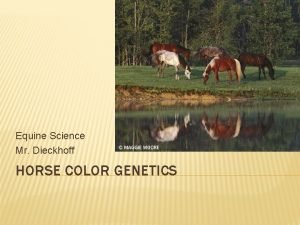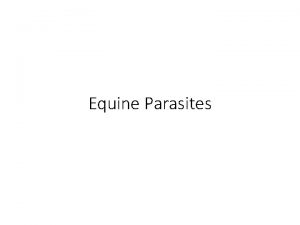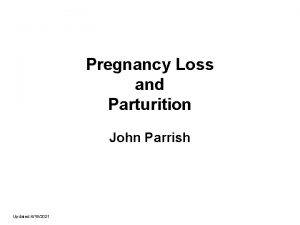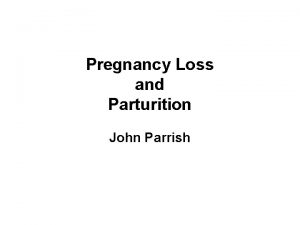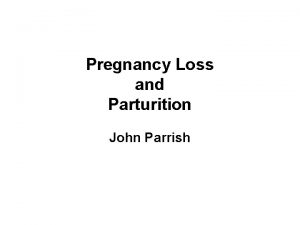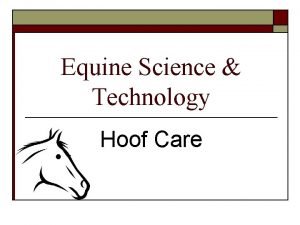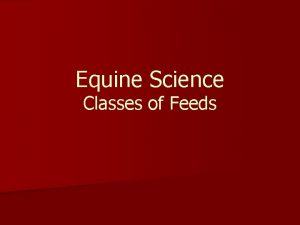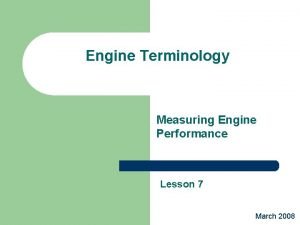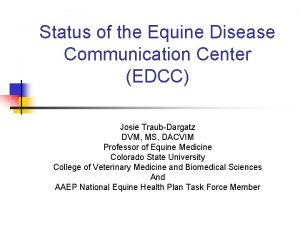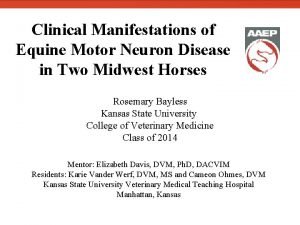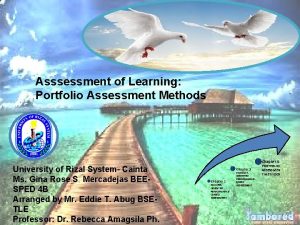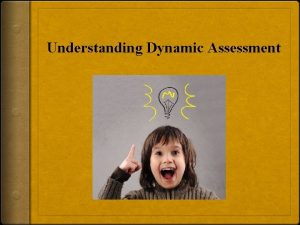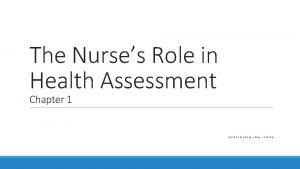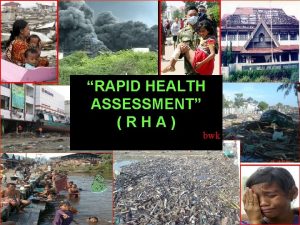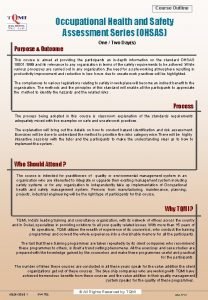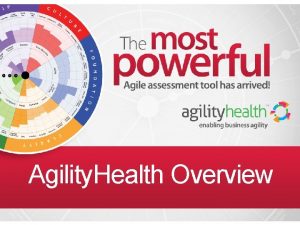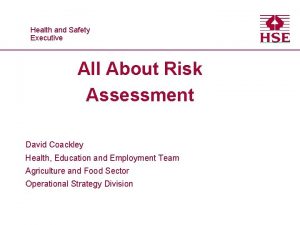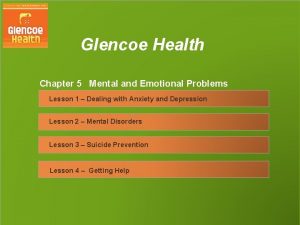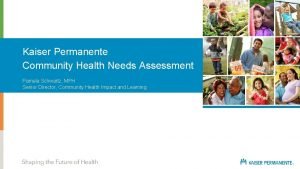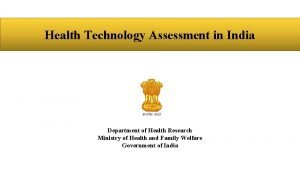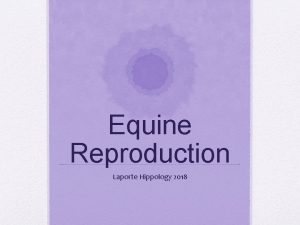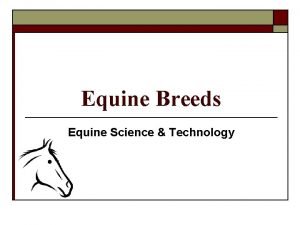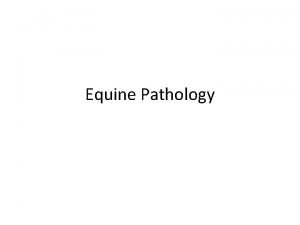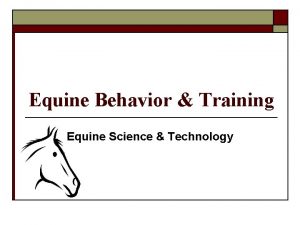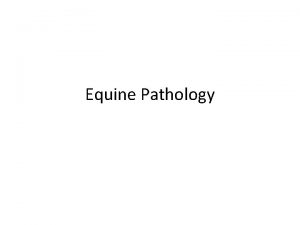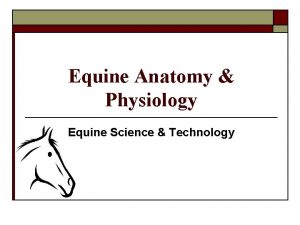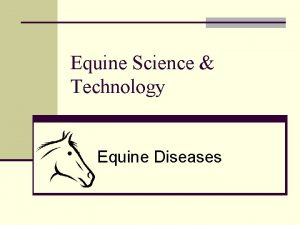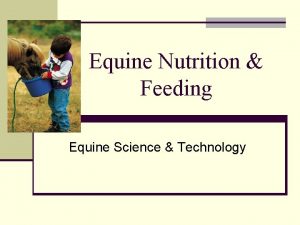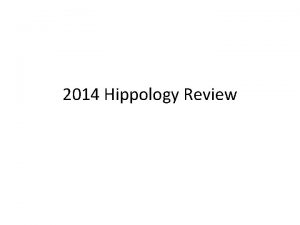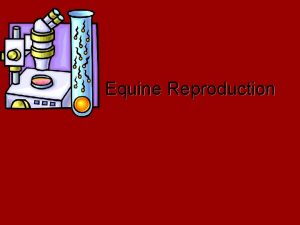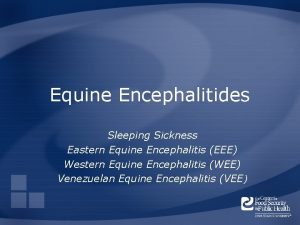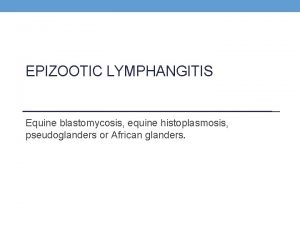Equine Health Assessment Hippology 2018 Equine Health Assessment




































- Slides: 36

Equine Health Assessment Hippology 2018

Equine Health Assessment Recognizing what is “normal” vs. “abnormal” horse behavior

Terms to Know Symptom = subjective evidence of a health issue Sign = measurable evidence of a health issue Disease = imbalance in normal function Infection = presence of an organism that causes a health issue Inflammation = the body’s response to injury, infection ”itis” Immunity = animal having producing or obtaining antibodies to fight off a health issue

Vital Signs Temperature = 99 -101 degrees F Pulse = 35 -45 beats per minute; under L elbow, Facial Artery inside jaw, digital pulse at the back of the pastern just above coronary band Respirations = 8 -16 breaths per minute Capillary Refill Time = 1 -3 seconds; gums (gingiva) Skin Pinch Time = 1 -2 seconds; near junction of neck and shoulder

INFECTIONS Parasites Internal vs. External Bacteria Viruses Fungi Protozoa Rickettsia

Parasites - Flies Biting vs. Non biting Lifecycle 1 -3 weeks Adult Eggs Larva Pupa Transmit diseases, annoyance to horse/rider

Parasites - Flies Clean stalls. Insecticides Bug zappers Fly predators Fly mask Repellents

Parasites - Mosquitoes Biting vs. Blood feeding Only females bite Transmit viruses Lifecycle 10 -14 days Shorten grazing time when mosquitoes are out. Eliminate standing water. Insect repellent.

Parasites - Lice Biting vs. Sucking Lice Transferred by direct contact. Worse in winter/spring. Cause anemia, sores on skin and itching. Due to lifecycle differences Treat q 2 weeks to eliminate

Internal Parasites

Internal Parasites • Important to know lifecycle pathway • Management depends on interrupting the lifecycle somehow. • ADULT -> EGGS -> LARVA -> PUPA

Where can internal parasites live?

Equine Digestive Tract Mouth -> Esophagus -> Stomach -> Small Intestine (duodenum, jejunum, ileum) -> Cecum -> Large Colon -> Small Colon -> Rectum -> Anus

Large STRONGYLES (Blood Worms) Large Strongyles – blood sucking intestinal parasite; cause inflammation of the blood vessels, anemia and blood clots Most common internal parasite 3 types (S. vulgaris, S. edentatus, S. equinus) Climate plays a big part in lifecycle

Large Strongyles

Large STRONGYLES

Small STRONGYLES Stay in Digestive Tract; DO NOT MIGRATE in BLOOD VESSELS! Found in Small intestine and Cecum 6 month lifecycle Bright red larvae in manure

Gasterophilus (Bots) • • • Bot flies lay eggs on horse Larva in stomach or small intestine. Lifecycle can take 1 year! Can cause mouth or stomach ulcers, colic Dewormer, fly repellent, pick up manure

Bot Larva

Gasterophilus (Bots)

ASCARIS (Roundworms) Affects only young horses < 18 months old 14 inches long in Small Intestine

Ascaris Lifecycle

Tapeworm • • • Mites eat tapeworm eggs. Horses then eat mites and are infected. Attach to lining of gut and take nutrients from the horse Infect stomach, cecum, small intestine Lifecycle lasts 2 -6 mo Anemia, weight loss, intestinal bockage, colic, infections Treatment with pyrantel and praziquantel

Tapeworms

Tapeworms

Pinworms • Primarily seen in stabled horses • Worms live in large intestine and anus • Female worms migrate to anus and lay eggs • Anxiety, restlessness, colic, rubbing hind end, skin sores • Tape test • Washing anus with warm soapy water and anthelmintics • Cannot be passed to humans

Pinworms

Pinworms


Bacterial Diseases In Horses • Anthrax Brucellosis Leptospirosis Lyme Disease Salmonellosis Strangles

Fungal Diseases In Horses Aspergillosis Blastomycosis Coccidiomycosis Histoplasmosis

Viral Diseases In Horses Equine Infectious Anemia Equine Influenza Equine Viral Arteritis Equine Viral Encephalomyelitis (Sleeping Sickness Eastern Western Venezuelan Rabies

Infectious Disease Control Vaccinations Biosecurity Parasite Control Program Quarantine new or sick animals

Equine Vaccinations

Vaccine Recommendations Core Recommendations Tetanus Rabies EEE WNV ? Equine Influenza

Vaccine Recommendations Risk Based Antrax Botulism Equine Herpesvirus Equine Viral Arteritis Potomac Horse Fever Rotavirus Strangles
 B a f c j e
B a f c j e Charlotte kin test
Charlotte kin test Lingfield equine vets
Lingfield equine vets Equine definition
Equine definition Us pony club stall card
Us pony club stall card Equine encephalitis
Equine encephalitis Equine encephalitis
Equine encephalitis Pasture pals equine rescue
Pasture pals equine rescue Equine viral rhinopneumonitis
Equine viral rhinopneumonitis Equine color calculator
Equine color calculator Equine
Equine Parturition
Parturition Equine
Equine Equine
Equine Equine science
Equine science Equine science
Equine science Indicated horsepower formula
Indicated horsepower formula Equine disease communication center
Equine disease communication center Rto incompass
Rto incompass Equine motor neuron disease
Equine motor neuron disease National business group on health conference 2018
National business group on health conference 2018 Features and principles of portfolio assessment
Features and principles of portfolio assessment Static assessment vs dynamic assessment
Static assessment vs dynamic assessment Portfolio assessment matches assessment to teaching
Portfolio assessment matches assessment to teaching Assessment skills
Assessment skills Subjective health assessment
Subjective health assessment Kapan pelaksanaan rapid health assessment dilakukan
Kapan pelaksanaan rapid health assessment dilakukan Occupational health and safety course outline
Occupational health and safety course outline Agile transformation inc
Agile transformation inc Ohio state health improvement plan
Ohio state health improvement plan Health and safety risk assessment template
Health and safety risk assessment template Glencoe health chapter 5 assessment answers
Glencoe health chapter 5 assessment answers Population health risk assessment and management
Population health risk assessment and management Component of health assessment
Component of health assessment Pamela schwartz kaiser
Pamela schwartz kaiser Htai bobigny
Htai bobigny Health technology assessment in india
Health technology assessment in india

